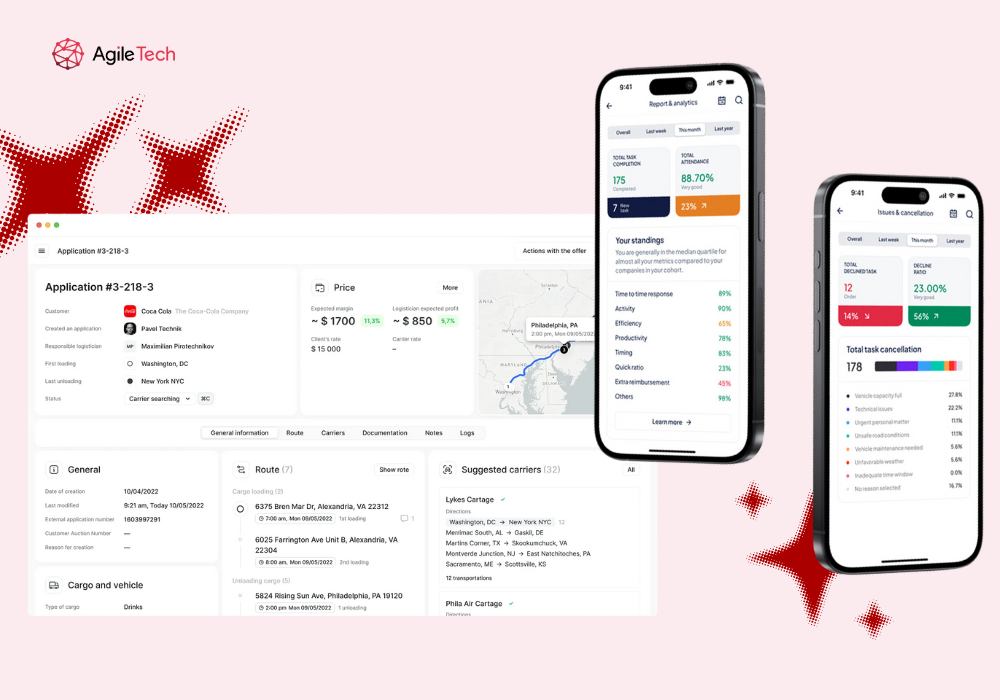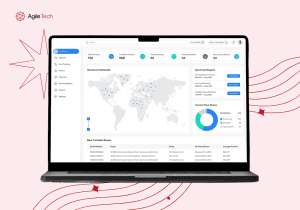
A GPS Fleet Management System Improved Petroleum Truck Tracking by 65%
A dominant petroleum distribution company in Ghana needed a fleet management vehicle tracking system to monitor their heavy-duty trucks carrying fuel across the country. With increasing fuel theft, route deviations, and inefficiencies in manual tracking, they required a GPS fleet management system (FMS) to enhance security, compliance, and operational efficiency.
Features
The GPS fleet management system was designed to address these challenges with the following key features:
- Vehicle and Driver Registration: A centralized database to store and manage vehicle and driver details for quick reference and compliance tracking.
- Live GPS Tracking: A real-time location tracking system that allows fleet managers to view the exact location of trucks on a digital map, ensuring visibility and security.
- Geofencing and Route Alerts: Alerts are set up to notify managers when trucks deviate from assigned routes or make unauthorized stops, enhancing security and route adherence.
- Automated Reporting: The system generates daily, weekly, and monthly reports detailing fleet performance, fuel usage, and route efficiency.
- Maintenance and Compliance Alerts: Automated notifications are implemented to remind operators of upcoming vehicle maintenance schedules, reducing the risk of breakdowns and regulatory non-compliance.
Challenges
The company faced several key challenges before implementing the fleet management vehicle tracking system:
- Real-Time Tracking of Heavy-Duty Vehicles: The client required a highly accurate tracking system to monitor the movement of petroleum trucks across Ghana in real-time. Any delay in tracking updates could result in serious logistical issues and increased risks.
- Monitoring Stop Points and Routes: Unauthorized stoppages and route deviations led to security risks, fuel wastage, and inefficient fleet management. Identifying and addressing these issues manually was a time-consuming task.
- Tight Deadline with Limited Resources: The development team had only 16 weeks to build and deploy the system, all while facing resource limitations and operational constraints due to the COVID-19 pandemic.
AgileTech’s Solutions
To tackle these challenges, the team implemented the following solutions:
Live Tracking and Alerts
A GPS-powered tracking system was integrated to provide real-time location updates. Automated alerts were triggered when a truck deviated from its assigned route or made an unscheduled stop.
Comprehensive Registration & Reporting
A structured module was developed for vehicle and driver registration, enabling fleet managers to track compliance records efficiently. Additionally, a reporting dashboard was introduced to generate performance insights, helping decision-makers optimize fleet operations.

Dockerized Deployment
Using Docker, the system was containerized to allow easy deployment and maintenance on the client’s local data center, ensuring minimal downtime and efficient scalability.
Agile Development Process
The team adopted an Agile methodology, working in sprints to ensure steady progress and timely completion of this GPS fleet management system within the given timeframe.

Project Outcomes
The implementation of the fleet management system (FMS) significantly transformed the client’s logistics and tracking capabilities:
- Enabled real-time tracking of petroleum trucks across multiple regions, providing managers with greater visibility over fleet movement.
- Reduced route deviations by setting up geofencing alerts that immediately notified fleet operators about unauthorized stoppages.
- Enhanced operational efficiency, allowing managers to make data-driven decisions using automated reporting.
- Delivered the project within the strict 16-week deadline, despite the challenges posed by limited resources and external constraints.
- Implemented a scalable, dockerized deployment, ensuring that future updates and system expansions could be handled efficiently.
The Impact
The fleet management vehicle tracking system delivered measurable improvements in operational performance and cost savings:
- 65% improvement in route compliance due to real-time GPS tracking and automated alerts.
- 35% increase in operational efficiency, as automated reporting replaced manual tracking and decision-making processes.
- 50% reduction in maintenance delays, thanks to proactive alerts notifying operators about vehicle servicing schedules.
- 25% cost savings in fleet management through optimized resource allocation and reduced fuel wastage.
Technologies Used
The GPS fleet management system was developed using cutting-edge technologies to ensure efficiency and scalability:
- Frontend: VueJS – Used for an intuitive, responsive, and user-friendly interface.
- Backend: FastAPI – Ensured high-speed data processing and API performance.
- Cloud Infrastructure: AWS – Provided cloud computing support for secure data storage and analytics.
- Containerization: Docker – Simplified deployment and maintenance of the system.
- Database: PostgreSQL – Used for efficient storage and retrieval of vehicle and driver data.
Post-launch Support
To guarantee long-term success and smooth operation, the following post-launch support services were provided for this FMS solution:
- Ongoing maintenance – Regular system monitoring and performance optimization to prevent downtime and ensure continued efficiency.
- Regular software updates – Periodic updates were rolled out to enhance system security, introduce new features, and improve overall functionality.
- Technical support and training – Dedicated support was offered to train the client’s internal team, allowing them to manage and operate the system effectively.
Project Images





Looking to build a GPS Fleet Management System?
Consult Industry Specialists
Connect with us today to discuss your software development needs and discover how our tailored outsourcing services can propel your business forward.